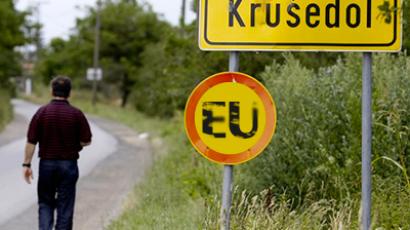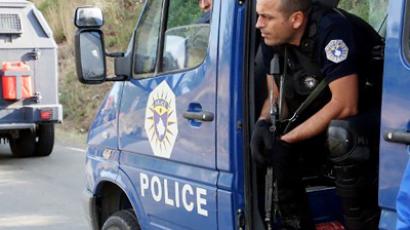EU, Kosovo take over disputed Serbian border checkpoints
Kosovo's prime minister announced that the breakaway region has introduced customs control on its border with Serbia, a move strongly opposed by Belgrade. Local Serbs have been trying to prevent it by blocking roads leading to the two border posts.
EU police and NATO-led troops have been deployed to the two sites. However, Serbia claims international representatives are only making the situation worse as they are siding with Kosovo authorities.Hundreds of Serbs are staging a protest in the northern city of Mitrovica to protest against Kosovo's actions.Belgrade, which does no accept Kosovo's independence, urged Kosovo Serbs to avoid the provocations and warned that the blockade of the crossings might lead to clashes. In response, Kosovo Prime Minister Hashim Thaci said the action was not aimed against any ethnic group, including the Serbs from the north."I call on Belgrade to finally abandon its desperate attempts to destabilize the region and accept once and for all that Kosovo is independent, sovereign and undivided," he said.
The European Union Rule of Law Mission in Kosovo, Eulex Kosovo, is a deployment of EU police and civilian resources to Kosovo. The Kosovo Force (KFOR) is a NATO-led international peacekeeping force responsible for establishing a secure environment in Kosovo. KFOR entered Kosovo on June 12, 1999 under a United Nations mandate, two days after the adoption of UN Security Council Resolution 1244.
RT’s correspondent, Sara Firth, who is at the Jarinje border gate, reported that the roads leading up to the crossing remain blocked by ethnic Serb protesters. Amid the smoke covering the customs building, some KFOR forces can be seen on the ground. Allegedly the smoke is coming from a fire behind the building. On Friday several Eulex helicopters arrived at the site, dropping off EU police forces to the disputed border posts.
The peacekeepers were already deployed to the region this past July following violent clashes between Kosovo police and local residents. All this was ignited after Kosovo's attempt to enforce a ban on imports from Serbia. As a result, a Kosovo policeman was killed, one post was burned down and several people were injured.
Earlier on Thursday, the United Nations Security Council gathered for an emergency session called by Russia in an attempt to prevent violence in the breakaway region.
'Situation in the region has reached a stalemate'
“This is a fight for their lives,” political analyst Aleksandr Pavic said of the Serbs.Serbs are in a corner now, believes Pavic, and they know the only choice they have is to resist.Since 1999, when NATO came in on a “peacekeeping mandate,” some 250,000 Serbs seem to have been swept out of Kosovo. And inside an Albanian-controlled territory they will probably be driven out as well, suggested the analyst. The West, however, has been sponsoring Kosovo independence for years now and they think they are now entering the endgame and giving a last final push, claimed Pavic. This makes the people even more desperate. The situation in the region has reached a stalemate, continued the expert, saying the Belgrade government has become a puppet of the West and really does not have many options left.
'No law and order for Kosovo Serbs'
Nebojsa Malic, a historian who specializes in the Balkans, says that in July the government of the self-proclaimed republic tried to block customs and stop the flow of goods from Serbia into Serb enclaves – and failed. “This attempt is an effort to try it again, try to subordinate that portion of the province to the authorities in Pristina,” he said. But the difference between the two attempts, he added, is that “this particular takeover, unlike the one in July, has actually been planed in advance and with the full assistance of the KFOR and the EU mission.”Malic argues that this time the purpose behind Kosovo’s actions is not necessarily to establish control of the customs posts. “Those checkpoints are the two main roads leading from Serbia to the Serbian-inhabited portion of Kosovo that not under control of the authorities from Pristina,” he told RT. “These border crossings have been a lifeline for the Serbs living in the north of the province.”Malic says there is truth to the accusations that the EU- and NATO-led missions in Kosovo have sided with the breakaway region's authorities.“This is not an accusation, this is a fact!” he stated. “The Albanian police that dropped into these checkpoints this morning were transferred by KFOR helicopters. The German-commanded forces are absolutely enforcing this on behalf of the Kosovo Albanian so-called government. How can they even pretend to be peacekeeping between the two clashing sides?”Malic spared no words in criticizing Pristina’s record.“This is the Albanian government trying to impose its right upon the Serbs of the province, which have 12 years of Albanian abuses to go by, knowing that they will not get any order or justice,” he declared. “This is a regime that’s accused of being a criminal syndicate – trafficking in drugs, sex slaves and harvested human organs – and we are supposed to believe that this is a law-and-order operation?”Meanwhile, Eulex has deployed the mission’s own police and customs officers at the two crossings, Jarinje and Brnja, to combat widespread smuggling."This is fully in line with the Eulex mandate, and the aim is very clear – we want to see the rule of law in Kosovo," stated Maja Kocijancic, a European Commission spokeswoman.














